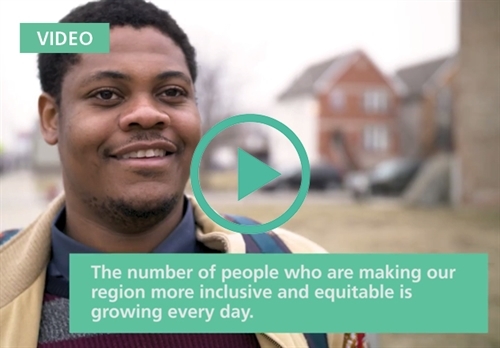
Melvin Williams of Storycatchers Theatre and CPD recruits participated in a cultural immersion training at the DuSable Museum of African American History.
Tweet this
This profile is part of a series that highlights the work of government, business and community leaders in creating a more equitable and inclusive Chicago region. Each of these stories is featured in "Our Equitable Future"—two dozen recommendations to advance equity MPC released in response to the 2017 Cost of Segregation findings.
In cities across the nation, the deaths of unarmed African Americans after encounters with the police have led to public outcry. Longstanding tension and outright conflict among law enforcement and predominately African-American communities is a complex and emotional issue.
In a city of well-documented racial and ethnic segregation, the Chicago Police Department (CPD) has been facing this issue for generations. In recent years, the department has worked to ease tensions regarding race and policing by creating more opportunities for conversations between officers and black residents, especially young people.
CPD officials implemented a variety of new programs, but one in particular has helped build cultural awareness: Since June 2017, every police recruit from the Academy has attended a cultural awareness experiential training at the DuSable Museum of African American History in Chicago’s Washington Park neighborhood. Officer Vanessa Westley, a 28-year CPD veteran, coordinates the mandatory program.
“Most of our young people who are coming on the job come from different places outside of the city,” Westley says. “This gives them a window into the neighborhoods that they’re going to be serving in, especially African-American neighborhoods.”
Recruits spend the day learning more about the role of law enforcement in the history of African Americans in Chicago. The customized tours of the museum’s exhibits and facilitated conversation expose the harm of discrimination and implicit bias. These difficult topics are handled most interactively during role-playing simulations led by Storycatchers Theatre, a youth development arts organization.
Melvin Williams, an Englewood native, was introduced to Storycatchers by his juvenile parole officer. During the training, he and other youth who’ve been involved in the criminal justice system share real-life stories of incarcerated youth and work with recruits to explore the impact of those experiences on their lives. For many of the youth, it’s one of the few positive interactions they’ve had with law enforcement. Williams says that participating in the training sessions has taught him that “you can’t judge a book by its cover.”
At the end of each role-playing session, the recruits and other young people discuss how everyone can take responsibility for creating positive interactions. The sessions with Storycatchers are Westley’s favorite part of the training because they give the recruits opportunities to live someone else’s story. For her, it’s proven that helping them remember their humanity and that of others is crucial to preparing officers to make informed choices in the field. We need more of that in Chicago, she says.
“We have to change. It’s important that we are very in tune to our communities and our city,” Westley says. “There is difference, but we’re striving for equity.”
Explore more of the stories in this series.
Who's advancing equity in the Chicago region right now?
This 5-minute video highlights some government, community and business leaders who are already taking action to make our region more equitable and inclusive every day.

MPC thanks CIBC US for generously sponsoring this video.
